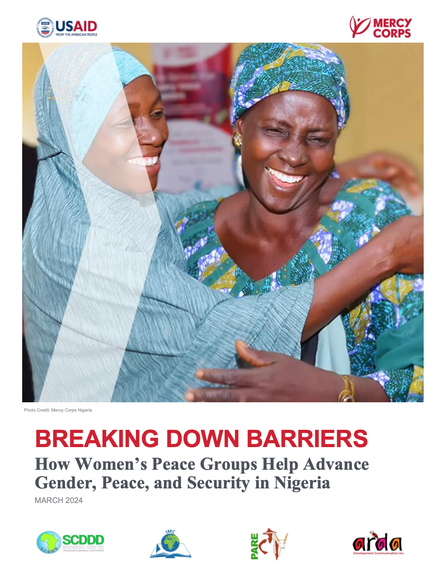
Conflicts in Nigeria have become increasingly complex over time due to a number of contributing factors, including limited socio-economic opportunities and resource-based and identity-based conflicts. The interconnected nature of these conflict drivers and the exclusion of women, youth, and other marginalized groups complicate response and peacebuilding efforts. Effective implementation of the Women, Peace, and Security (WPS) agenda at the local level can advance locally-led, gender responsive, and inclusive peacebuilding efforts, specifically through the meaningful inclusion and leadership of women.
As Nigeria is currently developing its third National Action Plan (NAP) for the implementation of UNSCR 1325 on the WPS agenda, valuable lessons regarding the integral role of women’s groups in addressing WPS priorities and gender mainstreaming in peacebuilding efforts should be considered. The experiences of the women’s groups established by Mercy Corps through the USAID-funded Community Initiatives to Promote Peace (CIPP) Program, a peacebuilding program implemented in the northwest and north central regions of Nigeria, provide such valuable knowledge.
To identify the lessons from CIPP’s women’s groups, Mercy Corps conducted a mixed-methods research study in 2023 focusing on the program’s Women’s Critical Discussion Groups (WCDGs) and Women Peacebuilding Councils (WPCs). The study identifies novel evidence and lessons that could contribute to the development and impact of Nigeria’s third NAP and the country’s overall gender, peace, and security (GPS) efforts, particularly at the community level.
Key findings:
In addition to the unique approach and contributions of the WCDGs and WPCs to community-level peacebuilding, the study’s findings identify three distinct ways in which strategies utilized by the WCDGs and WPCs expand GPS efforts at the community level, specifically:
- Women’s groups fill important gaps that other peace and security actors cannot fill;
- Effective GPS efforts prioritize youth engagement and intersectionality; and
- Collaboration and support from other peace and security actors, particularly male actors and security agencies, contribute to their success.
These findings lead to valuable recommendations for government and GPS actors developing Nigeria’s next NAP (such as the mobilization and allocation of sufficient resources for women’s peace groups) and for civil society actors focusing on GPS (such as the development and support of new or existing women’s groups, and the importance of connecting peacebuilding programs to other sectors).